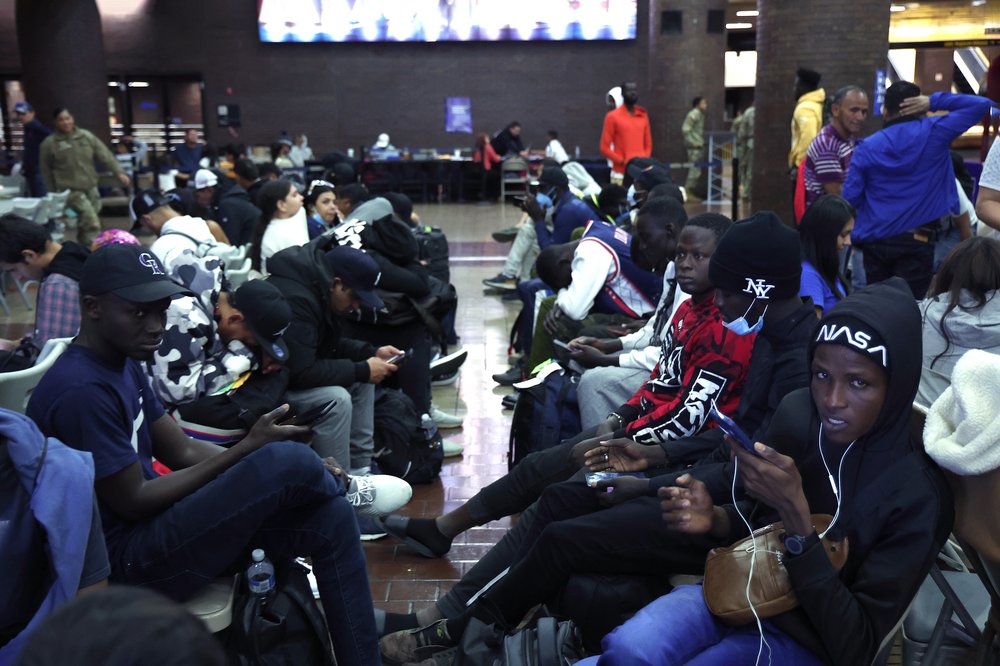Here's what New Yorkers need to know about President Trump's immigration orders
Jan. 25, 2025, 12:01 p.m.
In the first days of his new term, Trump issued a flurry of executive orders and edicts on immigration.

President Donald Trump issued a flurry of executive orders and edicts on immigration and enforcement in the first days of his new administration, seeking to counter what he called “a large-scale invasion at an unprecedented level.”
While the changes have already sparked legal challenges, immigration experts say the measures will have a direct bearing on immigrant communities in New York and beyond.
According to the Mayor’s Office of Immigrant Affairs, around 412,000 undocumented immigrants resided in the city as of 2022. Approximately 229,000 migrants arrived in the city beginning in that year, though fewer than 51,000 still reside in city-supported shelter.
“A nation without borders is not a nation,” Trump said, “and the federal government must act with urgency and strength to end the threats posed by an unsecured border.”
Here’s to know about five key actions taken by Trump this week.
Immigration arrests at schools and churches
The Department of Homeland Security said immigration enforcement officers could enter churches and schools, ending a long-standing policy regarding access to sensitive locations.
“Criminals will no longer be able to hide in America’s schools and churches to avoid arrest,” the department's statement reads. “The Trump administration will not tie the hands of our brave law enforcement, and instead trusts them to use common sense.”
The change marks an end to a practice for Immigration and Customs Enforcement officers, who have refrained from entering schools and churches since 2011, according to the Associated Press. Similar guidance has been in place for Customs and Border Patrol officers since 2013.
At a town hall in Corona on Wednesday, Mayor Eric Adams said “children should go to school.” His directive came in response to a question from an attendee who said immigrant families are increasingly concerned about the threat of raids by federal immigration officers.
Sanctuary cities
The Trump administration said it would cut off federal funding for sanctuary cities such as New York, which tend to limit cooperation between local government agencies and federal immigration agents.
The administration’s provision is contained within an executive order, “Protecting the American People Against Invasion,” and stipulates that “so-called ‘sanctuary’ jurisdictions, which seek to interfere with the lawful exercise of federal law enforcement operations, do not receive access to federal funds.”
In 2021 the Biden administration repealed a measure from the previous Trump administration that limited federal funding for sanctuary cities.
Muzaffar Chishti, senior fellow at the Migration Policy Institute office at NYU Law School, said the earlier directive from the Trump administration “was challenged in the courts, and most courts said that you cannot withhold funding for those kinds of actions or inactions of the government.”
Targeting local officials
The Justice Department in a memo to its workforce said local officials who do not comply with the administration’s immigration orders should be targeted for investigation and prosecution.
The memo, cited by NPR, was sent by acting Deputy Attorney General Emil Bove to all Justice Department employees.
"Federal law prohibits state and local actors from resisting, obstructing, and otherwise failing to comply with lawful immigration-related commands or requests," the memo reads.
In response, New York Attorney General Letitia James joined her counterparts in 10 other states in issuing a public rebuttal.
“The president has made troubling threats to weaponize the U.S. Department of Justice’s prosecutorial authority and resources to attack public servants acting in compliance with their state laws,” the statement says. “Right now, these vague threats are just that: empty words on paper.”
Birthright citizenship
Trump issued an executive order declaring an end to birthright citizenship, prompting a lawsuit by James and other attorneys general.
On Thursday, a federal judge issued a temporary halt to the measure, stating the order was “blatantly unconstitutional.”
“Amending the Constitution would require a two-thirds vote in both the House and Senate, and also ratification by three-quarters of the states," the ACLU noted.
But the measure has the backing of Republicans, including Rep. Brian Babin of Texas, who said birthright citizenship “incentivizes illegal immigration and exploits U.S. citizenship through birth tourism,” according to Scripps News.
Expelling immigrants
Trump issued an executive order revoking humanitarian parole for people who fled from four countries: Cuba, Nicaragua, Venezuela and Haiti.
The revocation was contained in an executive order, “Securing Our Borders,” which states: “My administration will marshal all available resources and authorities to stop this unprecedented flood of illegal aliens into the United States."
The Biden administration established the so-called CHNV program — for the initials of the four countries — in January 2023, and it allowed for a temporary stay of up to two years, provided that an applicant could secure a U.S.-based supporter, according to the American Immigration Council.
However, migrants from those countries could now be subject to expedited removal, according to a Homeland Security memo obtained by ABC News. Approximately 532,000 people have participated in the program nationally, according to Customs and Border Patrol data obtained by Voice of America.
Mayor Adams, amid deportation jitters, tells Queens town hall he’ll protect ‘all New Yorkers’ In NYC, amid deportation fears, a boom in know-your-rights sessions for immigrants